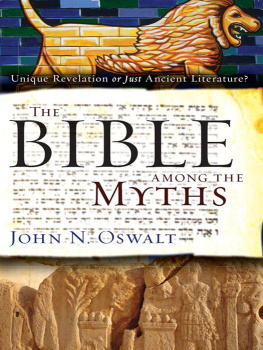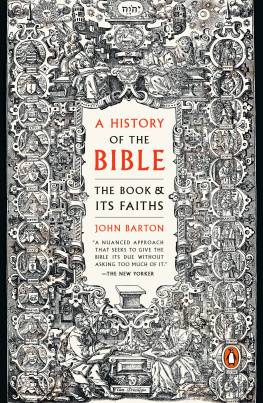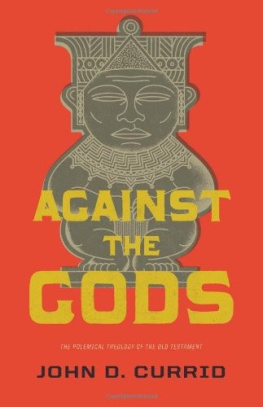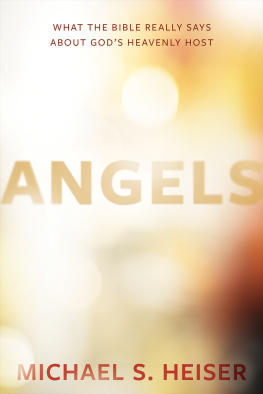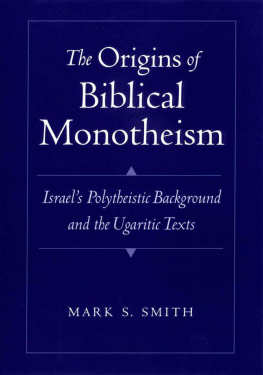I asked the earth; and it answered, I am not He, and whatsoever are therein made the same confession. I asked the sea and the deeps, and the creeping things that lived, and they replied, We are not thy God, seek higher than we. I asked the breezy air, and the universal air with its inhabitants answered, Anaximenes was deceived, I am not God. I asked the heavens, the sun, moon and stars. Neither, say they, are we the God whom thou seekest. And I answered unto all these things which stand about the door of my flesh, Ye have told me concerning my God, that ye are not He; tell me something about Him. And with a loud voice they exclaimed, He made us. My questioning was my observing of them; and their beauty was their reply. I asked the vast bulk of the earth of my God, and it answered me, I am not He, but He made me.
ST. AUGUSTINE, CONFESSIONS 10.6.9
ZONDERVAN
The Bible among the Myths
Copyright 2009 by John N. Oswalt
All rights reserved under International and Pan-American Copyright Conventions. By payment of the required fees, you have been granted the non-exclusive, non-transferable right to access and read the text of this e-book on-screen. No part of this text may be reproduced, transmitted, downloaded, decompiled, reverse engineered, or stored in or introduced into any information storage and retrieval system, in any form or by any means, whether electronic or mechanical, now known or hereinafter invented, without the express written permission of Zondervan.
ePub Edition August 2009 ISBN: 978-0-310-32242-9
This title is also available as a Zondervan ebook.
Visit www.zondervan.com/ebooks.
Requests for information should be addressed to:
Zondervan, Grand Rapids, Michigan 49530
Library of Congress Cataloging-in-Publication Data
Oswalt, John N.
The Bible among the myths: unique or just different? / John N. Oswalt.
p. cm.
Includes bibliographical references.
ISBN 978-0-310-28509-0 (softcover)
1. Myth in the Old Testament. 2. Bible. O.T.Historiography. 3. Bible. O.T.Evidences, authority, etc. I. Title.
BS1183.O85 2009
220.1dc22 2008044722
Scripture taken from the Holy Bible, Todays New International Version . TNIV. Copyright 2001, 2005 by International Bible Society. Used by permission of Zondervan. All rights reserved.
Any internet addresses (websites, blogs, etc.) and telephone numbers printed in this book are offered as a resource. They are not intended in any way to be or imply an endorsement by Zondervan, nor does Zondervan vouch for the content of these sites and numbers for the life of this book.
All rights reserved. no part of this publication may be reproduced, stored in a retrieval system, or transmitted in any form or by any meanselectronic, mechanical, photocopy, recording, or any otherexcept for brief quotations in printed reviews, without the prior permission of the publisher.
Interior design by Sherri L. Hoffman
This book is dedicated to
Dr. Dennis F. Kinlaw
Teacher, Mentor, Confessor, Friend
CONTENTS
A long with my teachers, G. Herbert Livingston, Dennis F. Kinlaw, and Cyrus H. Gordon, I also want to express my thanks to several hundred students who have studied this material with me over the past thirty years. They have continually forced me to sharpen and redefine my thinking on the subject.
More recently, I am grateful to colleagues G. Stephen Blakemore, Daniel Block, Tremper Longman III, John Walton, and Joseph Wang, who have read part or all of the manuscript and have made helpful comments. Of course, any errors or inadequacies are my responsibility alone.
To this list I must also add the names of Stanley Gundry, Katya Covrett, and Verlyn Verbrugge, publisher and editors at Zondervan, who have encouraged me and helped to shape the present volume.
Finally, I can only say to Karen, my wife of more years than either of us can believe, without you none of this would be.
T he ideas presented in this book have had a long period of maturation. I was first introduced to the subject and the issues in a course entitled The Literature of the Ancient Near East, taught by Dennis Kinlaw at Asbury Theological Seminary in the 1960s. The seeds planted there began to germinate and grow during my graduate study with Cyrus Gordon in the Mediterranean Studies department at Brandeis University. They have reached their present level of maturity (such as that is) as a result of thinking them through with students in courses I have taught at Asbury Theological Seminary, Trinity Evangelical Divinity School, and Wesley Biblical Seminary.
In the period of time since that first course at Asbury Theological Seminary, thinking on the subject has undergone an almost complete change of direction. By the late 1940s two world wars punctuated by a world-wide economic depression had raised some serious questions about the evolutionary paradigm inherent in the philosophy of Idealism. And since that paradigm was all but inseparable from the standard higher critical views of the Old Testament that had prevailed for the previous fifty years, there was cause for some rethinking about the Old Testament and the religion it promulgated.
That rethinking was led by William F. Albright and his students, among them G. Ernest Wright of the Harvard Divinity School. Speaking for much of the scholarly community of the time, Wright argued that the differences between the Israelite way of thinking about reality and the way in which Israels neighbors approached that topic were so significant that no evolutionary explanations could account for them.
What has happened to cause such a dramatic change in thinking? Have some new discoveries made Wrights position untenable? No, they have not. The literatures of the ancient Near East, including that of Ugarit, which are now cited to prove the case against Wright, were already widely known at the time his book was written. The Dead Sea Scrolls were just coming to light, but they have not materially altered the picture of ancient Israel that was known in 1950. So what is the explanation? I do not wish to belittle either the ability or the motivation of current scholars. Their mastery of the field and their genuine concern to ferret out the real facts are not in question. Nonetheless, I am convinced that it is prior theological and philosophical convictions that account for the change and not any change in the data.
In 1950, largely because of the work of Karl Barth, the scholarly world was ready to entertain the idea of revelation in ways it had not been for at least a couple of generations. Undoubtedly, the near destruction of European civilization in the previous forty years contributed to that readiness. Revelation assumes that this world is not self-explanatory and that some communication from beyond it is necessary to explain it. Ready to believe in such a possibility, Old Testament scholars in the 1950s saw evidence for it in the manifest differences between the understandings found in the Old Testament and the understandings of all the peoples around Israel. None of that data has changed. The differences between Genesis and the Babylonian account of the origins of the world, for example, are unmistakable to anyone who reads them side by side.
But the idea that this world is not self-explanatory and that revelation from beyond it is necessary to understand it is profoundly distasteful to us humans. It means that we are not in control of our own destiny or able to make our own disposition of things for our own benefit. This thought, the thought that we cannot supply our ultimate needs for ourselves, that we are dependent on someone or something utterly beyond us, is deeply troublesome. This is especially true in the light of the revolution in thinking that occurred in the United States in the 1960s and 1970s. The turn away from outside authority of all sorts to extreme individual autonomy was utterly inimical to the idea of revelation. So, although the biblical and ancient Near Eastern data had not changed at all, the possible way of explaining that data did change. Revelation was no longer an option. But without revelation, how can the differences be explained?
Next page
